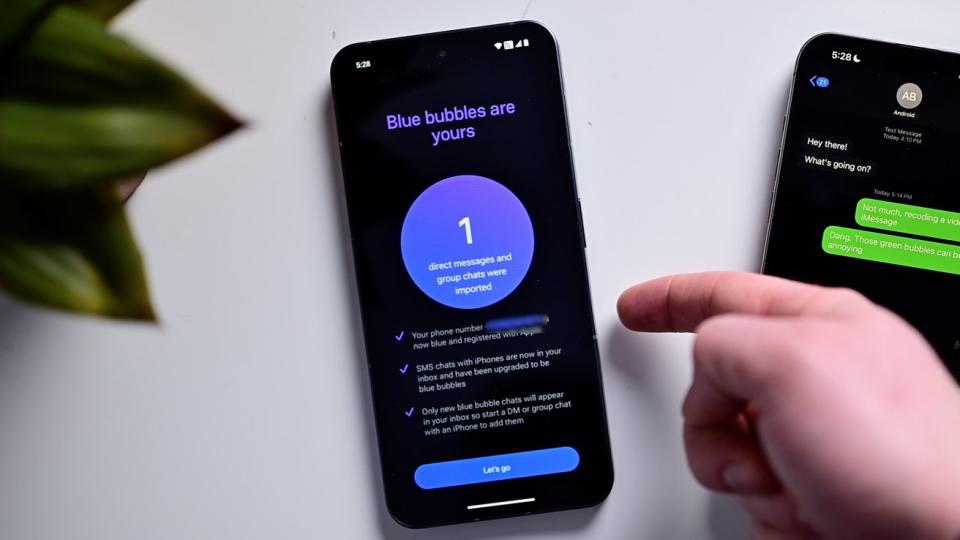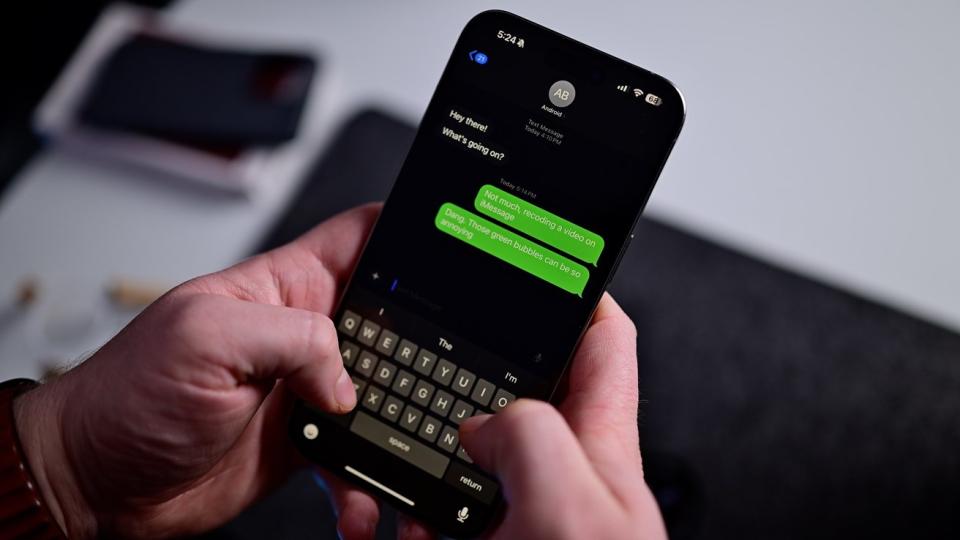
The iMessage cat-and-mouse game played by Apple, the Beeper Mini, and others in the Android ecosystem makes exciting headlines but is a miserable user experience for everyone — and we all deserve better.
Privacy. This is an iPhone.
First, let’s admit that cross-platform messaging is a bloody mess. But neither Apple nor Beeper are making things easier for the rest of us right now.
Apple and the makers of the Android app Beeper Mini have been engaged in a back-and-forth game over the past week. In short, the Beeper Mini promises to safely turn Android users into blue bubble friends for iPhone users. Apple stopped this issue almost immediately, due to the inherent security risks.
The tricky thing here is that both companies have a point. While there is a solution in the wings, the Beeper Mini is not.
Stay on message
You may remember that the Android-powered Nothing Phone disastrously promised this capability back in November. But no sooner had it been announced than it was severely shut down.
The Nothing Chat app that facilitated this functionality appears to be nothing more than a redesigned version of the already infamous Sunbird messaging app. The company promises end-to-end encryption (E2EE), assuming you’re willing to trust it with your iMessage login credentials.
It turned out to be a big mistake. In fact, the messages were publicly available in plain text. It was a complete disaster, and was quickly pulled from general release.
The developers of the Beeper Mini say they’re different. The app is based on the work of a 16-year-old high school student who allegedly reverse-engineered the iMessage protocol.

Beeper Mini is being set up
Unlike Nothing Chats, and for that matter, Beeper’s own Beeper Cloud service, there’s no server standing in the middle to mitigate the flow of information between Android devices running the Beeper Mini and the Apple ecosystem.
Apple doesn’t buy it. The company declared the Beeper Mini posed “significant security and privacy risks” and closed access to it on Friday.
Apple is not wrong here.
It doesn’t matter if the solution makes you put your iMessage credentials on a server in plain text, like Nothing Chat’s stupid and poorly implemented system. Or if it’s clever reverse engineering of iMessage protocols to fake your Android phone to look like an iPhone.
Either way, Apple cannot guarantee the safety and security of iMessages outside its borders. What’s more, it shouldn’t.
On Monday, Beeper released an update to address Apple’s mitigation measures. This is certainly not the last we’ve heard about the Beeper Mini or Apple’s reaction.
The cat-and-mouse game has also drawn the ire of politicians. Sen. Elizabeth Warren (D-Mass.) in a letter to X over the weekend accused Apple and other tech companies of “protecting profits by crushing competitors” by keeping the Beeper Mini out of business. It completely misses the point of scoring political points, but that’s not really the issue here.
The end is in sight
This latest impasse over blue bubbles versus green bubbles in text messages will likely be resolved in 2024, once Apple introduces support for Rich Communications Services (RCS).
Apple’s support for RCS is a great validation of RCS overall. This standard, developed by the GSM Association, has already been adopted by many Android device makers and software developers, and provides a richer and fundamentally better experience than SMS or MMS.
A lot of the technical issues iPhone users have with their green bubble buddies will go away with RCS. It will be easier to share high-resolution photos and videos, engage in group messaging, and do things like share locations more easily.

Green bubbles have a lot of issues
If there is more than one technical issue related to those green bubbles, iPhone users will have to overcome them. RCS must be given technologically effective parity, so there is no reason to mock those who have these systems.
But even then, there will be an obstacle. Apple says it will support the RCS Universal Profile, the standard published by the GSMA, and this profile does not currently support end-to-end encryption (E2EE).
E2EE is currently supported on Android devices thanks to Google’s own extension. Apple is not going to hitch its horse to this cart.
Instead, Apple said it will work with the GSMA to add encryption to the global standard.
So, Android users will have to bear with us for a while longer, as 2024 looks set to be a sea change in the way we all talk to each other. In the meantime, be very skeptical of “blue bubble” solutions for your Android device — and don’t expect Apple to back down when new products that promise a solution appear.
In today’s digital age, communication is more important than ever, and Apple and Android users are constantly on the lookout for the best chat platforms to stay connected with friends, family, and colleagues. The Beeper Mini aims to provide a solution for users who are looking for a chat platform that offers seamless integration across different messaging services. With its promise of a unified chat experience, Apple and Android users are eagerly anticipating the arrival of the Beeper Mini in their quest for better and more efficient communication.

